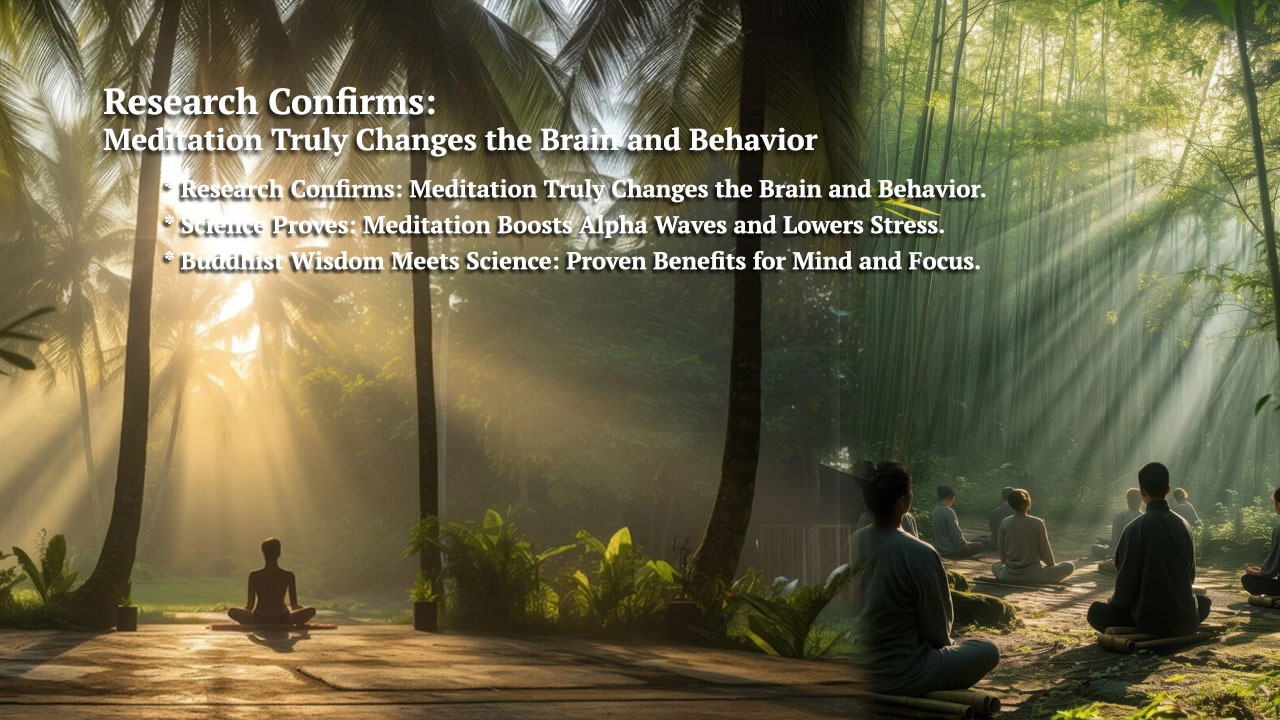Scientific benefits of meditation: Linking the Buddha’s Words with Global Research

Meditation for mental health: Why is Meditation the Answer for a Chaotic Era?
In an age of information overload, Scientific benefits of meditation are clear. Stress has become a common part of daily life for many people. Meditation for mental health is not just sitting still with your eyes closed. It is a vital practice of “training the mind to be aware.” This training clearly affects mental health, focus, and behavior. These positive effects are seen at both the personal and social levels. However, meditation practice can be even better. It should be firmly rooted in the Buddha’s original teachings. This is the “Buddha’s words” (Puttavacana). It emphasizes a direct and simple approach to mindfulness. This approach involves Anapanasati breathing practice and body contemplation.
Research Confirms: Meditation Truly Changes the Brain and Behavior
Studies both in Thailand and internationally have explored these effects.
Thai Research Findings
- Counting Breaths with Binaural Beats Burapha University research found counting breaths helps control emotions. It also increases alpha brain waves in participants. Alpha waves relate to calm and focused attention. This aligns with the Thai Buddhist meditation tradition. It stresses “knowing the in-and-out breath without fabrication.”
- Art Meditation for Mental Well-being Chulalongkorn University suggested a combination of meditation and art activities. It helps to lower stress and increase positive thinking. This supports the practice of body contemplation (Kayagatasati). This practice focuses on firmly establishing the mind within the body. Scientific benefits of meditation are consistently being shown.
- Meditation in Schools for Moral Development Students who regularly practice Buddhist meditation techniques show improved calm and ethics. This matches the Buddha’s words that “meditation development” (Samādhi Bhāvanā) can subdue negative states. It also inclines the mind toward liberation.
International Research Findings
- Mindfulness-Based Stress Reduction (MBSR) Jon Kabat-Zinn developed this program. It uses Breath awareness meditation and non-judgmental thought observation. This resembles Anapanasati and contemplation of the mind (Cittānupassanā) in the Buddha’s teachings.
- EEG and fMRI with Meditation Several Meditation and brain research studies have made a discovery. Scientific benefits of meditation include an increase in alpha and theta brain waves. This occurs during Anapanasati breathing practice. They also show changes in brain areas related to memory and emotional control. This aligns with the Buddha’s words about the “benefits of meditation” (ānisong). These benefits include suppressing love and hatred. They also include not drifting away from meditative absorption. The Thai Buddhist meditation tradition provides a strong foundation for this practice.

Anapanasati breathing practice: The Buddha’s Words: Meditation Without Fabrication
The Buddha’s words focus on training the mind with “teachings from the mouth of the Buddha.” This is done without adding unnecessary beliefs or rituals. Key features are:
- Anapanasati: Clearly knowing the in-and-out breath with mindfulness.
- Body Contemplation (Kayagatasati): Fixing the mind on the body to prevent distraction.
- Meditation Development (Samādhi Bhāvanā): Training the mind to be steady and incline toward liberation.
- Benefits (Ānisong): Suppressing negative states and creating a calm and insightful mind. Scientific benefits of meditation confirm these outcomes.
Linking Science and the Dhamma: The True Middle Way
In summary, research in both Thailand and other nations confirms a significant point. “Knowing the breath” and “fixing the mind on the body” positively impact mental health. They also improve behavior. This remarkably matches the teachings found in the Buddha’s words. Therefore, practicing the Buddhist meditation techniques of the Buddha’s words is not merely religious practice. It is truly “caring for the mind with a scientific basis.” This approach can be effectively applied in daily life. This is why Meditation and brain research is growing worldwide. Breath awareness meditation is a universal tool.
Scriptures that Affirm the Principles of Meditation in the Buddha’s Words
To enhance the credibility of this meditation approach, we cite key Thai Buddhist meditation tradition scriptures:
- The Samādhi Sutta (Pali Canon Vol. 21, Item 41) The Buddha spoke of four types of benefits of meditation development. These are for a happy dwelling in the present, for obtaining knowledge and vision, for mindfulness and clear comprehension, and for the destruction of defilements (āsavas).
Note : Scientific benefits of meditation research continues to explore these ancient claims. - The Ānāpānasati Sutta This discourse states that knowing the in-and-out breath is the direct path. It leads to the four foundations of mindfulness (Satipaṭṭhāna). This then leads to the factors of enlightenment and to liberation (Nibbāna).
Follow us for more insider guides and updates on Thailand’s top destinations and experiences. @thaiimpact on x.com







